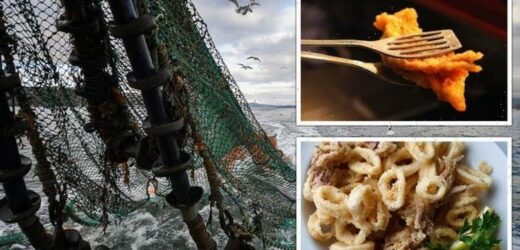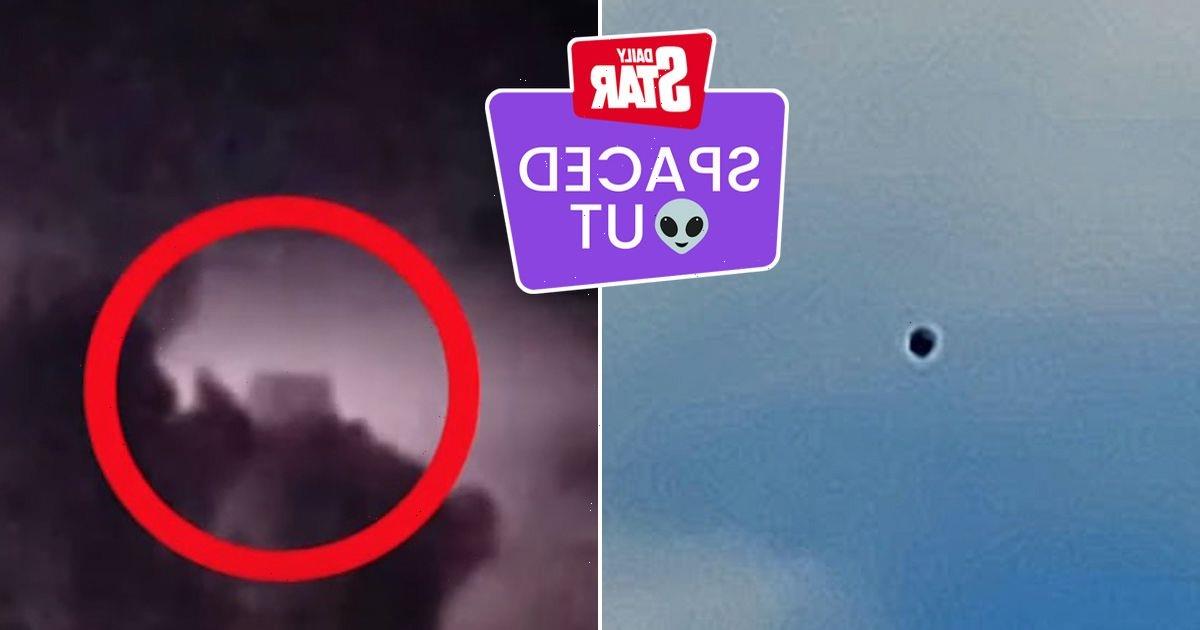Fisherman says post-Brexit fishing deal is ‘bias’
We use your sign-up to provide content in ways you’ve consented to and to improve our understanding of you. This may include adverts from us and 3rd parties based on our understanding. You can unsubscribe at any time. More info
Fishermen who run out of quota are said to be targeting squid more and more as there are no limitations on catches. The Marine Conservation Society (MCS) has now put UK-caught squid on its red list of “fish to avoid” on its updated Good Fish Guide. UK squid catches in the northeast Atlantic have gone up 40 percent from 2,362 tonnes in 2015 to 3,315 tonnes in 2019.
Charlotte Coombes the Good Fish Guide programme manager, said: “We don’t know enough about squid species in UK waters, which is worrying because it means we don’t know if they are able to withstand being fished at current levels.”
North Sea cod also remains on the red list because of its low stock levels as fisheries ministers in both the UK and the EU set quotas above the recommended level set by scientists, according to the MCS.
Because cod is a cold-water species, it is also being impacted by rising sea temperature which reduces the survival rate of juvenile cods.
The MCS reported that two of the UK’s other cod populations, in the Celtic Sea southwest of England and west of Scotland, were also red-listed.


They said the UK’s only other cod stock, in the Irish Sea, was in a poor condition and amber listed, which means buyers look for a more sustainable choice.
Ms Coombes said: “Populations [of cod] are so low that they may not be able to reproduce and keep the population going.”
MCS instead recommends that buyers opt for Icelandic cod or Arctic cod certified by the Marine Stewardship Council.
The charity is has urged the Government to use Brexit freedoms “to show real leadership and be the first nation in the world to set a course to deliver sustainable fisheries”.

MCS said all catches must be fully documented and verified by cameras and sensors on every vessel that captures images and data to be inspected remotely.
They said the cameras would help detect bycatch of seabirds, porpoise, and sharks, a serious problem in the southwest due to the use of gillnets.
Gillnets are long nets that hang straight down in the water.
Fish and other species swim into the nets and get tangled up in them.
The Fisheries Act 2020 set a target for Britain to collect more data on catches, but the MCS slammed the government for failing to use its powers in England to get vessels to use remote electronic monitoring like cameras.
DON’T MISS
EU energy crisis: VDL panics as Russia chokes 70% of supplies [REPORT]
Putin ‘at war’ with EU as gas price hits record high – Merkel slammed [INSIGHT]
China forced to beg for Australia’s help after Taiwan war threat [REVEAL]

The charity also said the recovery of European hake since the early 2000s, when stocks were at an all-time low, highlight the benefits of imposing catch limits and changes to fishing methods.
Nets used to catch hake now carry pingers, which are acoustic alarms that deter marine mammals from approaching and reduce bycatch risk.
The MCS also recommends that buyers inspect the packaging on fish to check not the area where it was caught, but also the method of fishing that was used for the catch.
The same species of fish can be given a green or red rating depending on location or method used to catch it.

Gareth Cunningham, MCS head of fisheries, said: “The UK’s waters are changing due to the impacts of climate change.
“Whilst some species may flourish in warming waters under the right management, others will not fare so well.
“Through the adoption of fully documented fisheries and fisheries management plans, UK seafood could be made sustainable for many years to come.”
Source: Read Full Article


